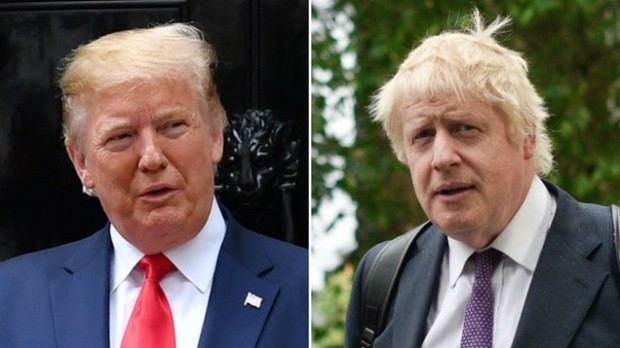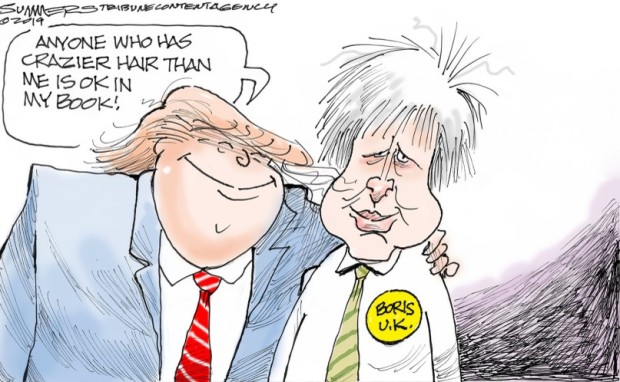The Anglo-Saxon world, comprised of Great Britain and the United States, is being ruled, in the minds of many, including this author, two incendiary and divisive leaders, prime minister Boris Johnson and president Donald Trump, respectively. While critics abhor their aggressiveness, truculence, general disregard for political conventions, and unwillingness to ever admit mistakes, their defenders extol this approach as being effective and in contrast to the anodyne talk of politicians who are anyways corrupt and ineffective.

Do they do to the same barber?
Donald Trump’s rise stunned the political world and until the eve of his electoral triumph in 2016, few predicted he would gain the presidency. That having occurred, it was hoped that Trump, humbled by the stature of the office, would temper his contentious rhetoric and attempt to heal the wounds of a deeply divided country. This has not proven the case, and Trump continues to use language that is deeply offensive to minorities and others with whom he disagrees.
Given Trump’s history, this is hardly surprising. He came to prominence as a real-estate tycoon in the 1980s, a time when greed was deemed to be “good” and ostentation celebrated. Trump embodied that storyline, naming gaudy buildings and establishments after himself, ditching his wife for a super model, and then her for another one, and with his mane of bleached blond hair, became a caricature of nouveau money.
More nefarious and a premonition of what was to come occurred in 1989. After four black teens were arrested for the brutal rape of a white woman in Central Park in 1989, Trump took out of a full page advertisement in several New York newspapers, including the New York Times, demanding the death penalty be brought back, specifically for these boys.
These teenagers, on scant evidence, were convicted and sentenced to long prison terms. Eventually their innocence was proven and they were released. Trump has never apologized for this egregious act. Similarly, during the Obama presidency, Trump aggressively peddled the falsehood that Obama hadn’t in fact been born in the US, and thus was an illegitimate president (presidents have to be born in the country.) Even after Obama’s birth certificate was produced, Trump refused to back down.

It is thought that after Obama goaded him at a press dinner, making him appear ridiculous, he decided to run for president. The rest, as they say, is history.
Boris Johnson is sometimes called Britain’s Trump, with some degree of accuracy though in many ways he is quite different. Johnson’s approach to politics is similar to his counterpart across the ocean, a take-no-prisoners approach, refusing to compromise, maligning opponents as traitors and appealing to the baser instincts of his followers.
However, their trajectories have been very different. Johnson attended Britain’s most elite schools and university, with a degree in ancient history and displays considerable erudition when called upon. He became a journalist, where he was based in Brussels and propagated many of the myths about the excesses of the European Union regulations and harm the institution was doing to Britain. In fact, an early indicator of his mendacious nature was when he made up quotes for an article, for which he was fired. No matter, he moved to another paper and impugned the European Union at every opportunity.
He entered politics in 2001 and eventually became London mayor in 2008. Even critics admit that Johnson was effective in this mostly ceremonial role, his charisma and ability for self-deprecation (in contrast to Trump, who modestly calls himself a “very stable genius”) making him popular with Londoners who saw him as a kind of likeable buffoon.
His buffoonery, however, masked a searing ambition and his very right-wing mindset, and when Brexit came along, he saw a perfect opportunity to seize the issue and head the leave campaign which was eventually successful. The quagmire into which Britain plunged after this vote has seen the demise of two prime ministers and the assumption of this position by Johnson himself.
Both Trump and Johnson are facing recent difficulties, with the US president facing impeachment and Johnson losing a series of parliamentary votes that have forced him to seek an extension to Britain’s exit should a deal not be reached by October 19.
The impeachment proceedings launched against Trump by the US House of Representatives are based on a phone call Trump had with the new president of the Ukraine, Volodymyr Zelensky. In it, Trump seemed to say that for the US to release economic aid to Ukraine, in return he asked for a “favor” whereby the Ukraine would investigate Hunter Biden, son of former vice-president Joe Biden, a political opponent of Trump’s.
This is clearly illegal, but the chances of the Trump being impeached are slim. Although the House of Representatives, now controlled by the Democrats, will likely reach a majority to send impeachment proceedings to the Senate, this body not only has a Republican majority but for impeachment 2/3 of senators have to approve it and this seems extremely unlikely. In 1998, president Bill Clinton was impeached by the House, but not the senate and therefore was able to stay in office.
Trump, however, has, true to his style, relentlessly attacked the process, suggesting those responsible for bringing it are traitors and should be tried for treason. Things are moving along swiftly.
Almost immediately after assuming the post of prime minister, Boris Johnson requested that the queen prorogue (suspend) Parliament, ostensibly so that he could prepare his agenda for her speech but obviously so that MPs would have no influence on the Brexit negotiations. This move immediately went to the courts and the Supreme Court decided that Johnson had misled the queen and Parliament was to be called back.
Although humiliated by the courts and the legislature, Johnson presses on with bravado and jingoism, declaring that he will not (as he is now required to do by law) seek an extension past the October 31 deadline and that if necessary, the UK will leave the European Union without a deal.
Trump, and to a lesser extent Johnson, have pushed the limits of their power and changed the way politics is done. Civility to opponents seems to be a thing of the past and Trump’s twitter account implacably excoriates those who act against him as ‘losers’, ‘cowards’ and worse.
With upcoming elections in both countries, are these two blond bombshell’s days numbered? I wouldn’t bet on it.